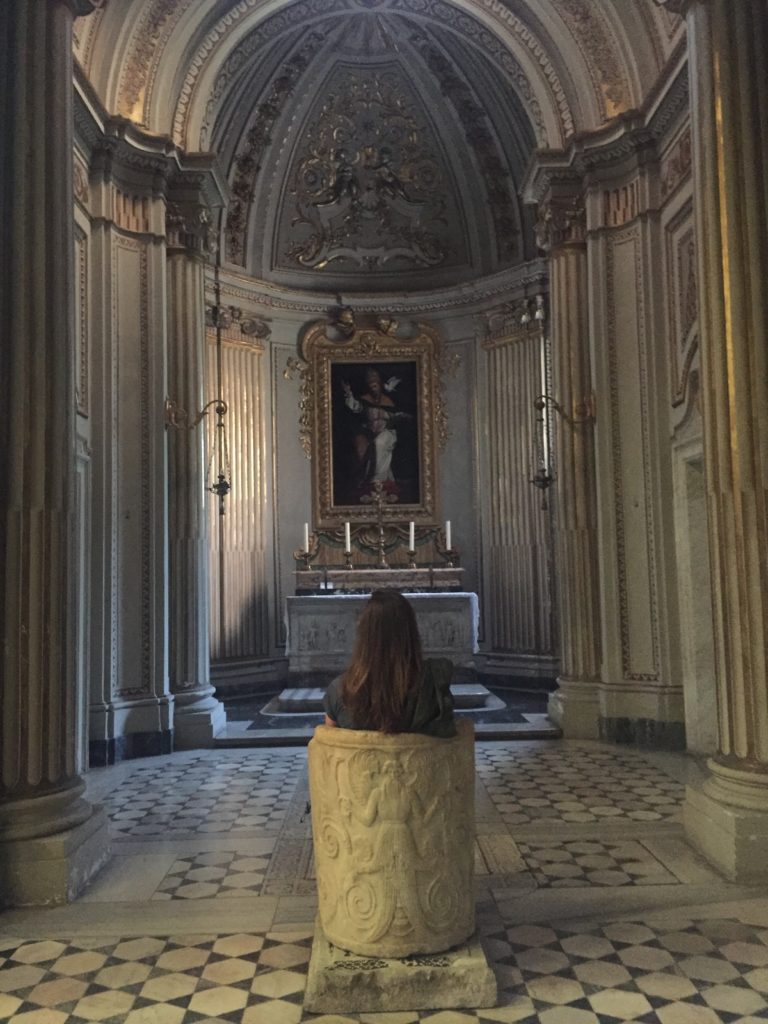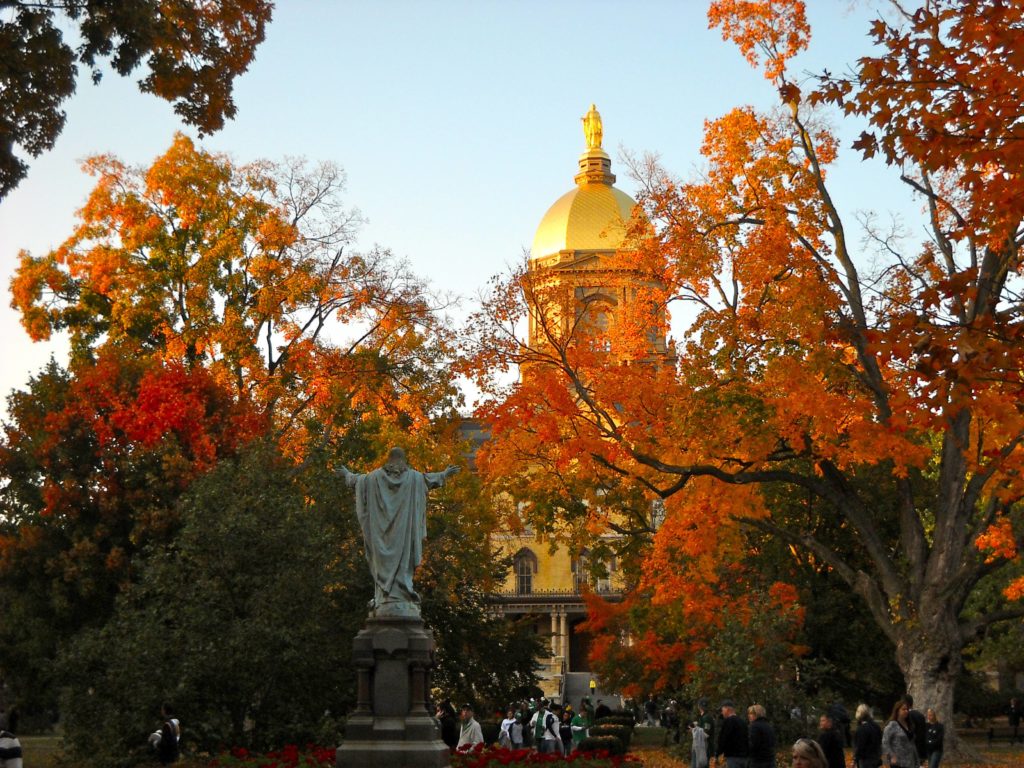Senior Anchor Intern, Katherine Smith – Sacramental Prep & Catechesis
As the days grow shorter and I begin to pull out my boots and scarves on these late fall days, I feel my whole approach to the semester shifting. Anticipation for home—for Thanksgiving with family and Christmas in Minnesota—has set in. At the same time, almost as if these holidays are the winter hibernation that ensue fall semester, I find myself frantically trying to prepare for and accomplish all that must happen between now and Christmas break. I mean, suddenly I feel a surprising association with our squirrel friends trying to fatten up for winter as I wonder if I’ll have enough flex points to see me through another month of research papers and tests! Needless to say, I find my thoughts and life patterns becoming more and more narrowly focused and closing in upon themselves—really, patterns of survival in the chaos. The endless to-do lists that threaten to overwhelm my thoughts during Mass or prayer, the reminders from friends that I’ve forgotten to spend time with them, or the lack of wonder at the glories of burning fall foliage as I hurriedly traverse campus speak to the all-consuming nature of this mentality. What I myself need to do for me becomes the mantra. But, with this mindset, I know I am closing off what is most important. Where is the space to hear God speak? To recognize His presence in another? To receive and share His Goodness?
In the midst of this hibernation preparation, if not for the questions from friends and acquaintances across campus about my fall break, I might have easily forgotten that only two weeks ago I was on pilgrimage in Rome during the Synod on Young People, the Faith and Vocational Discernment. With a dozen other Notre Dame students I had the privilege of experiencing the Church through the beauty of Rome’s churches, art, and legacy of the saints and opening myself up to the broader reality of the universal Church.

As we engaged the Synod as youth, I was reminded that despite the great brokenness of the Church it still offers me the greatest of gifts in and through Christ. I left Rome knowing that Christ pours out His Goodness so totally in the sacramental life of the Church and my responsibility as a member of the Body of Christ is to receive and then share the Goodness of Christ with everyone I encounter. Much of this realization came from my one duty during the Synod pilgrimage: to reflect on the transcendental virtue of Goodness in my own life. As I began to reflect on Goodness and write about my experience, God called me to look back at something so different than—so utterly opposed to—the safe and self-preserving attitudes I find myself slipping into now. I needed to concretely put into words what C.S. Lewis’s quote about God, “I am not safe, but I am good,” means. I needed to remember my experiences in Kolkata, India during an ISSLP two summers ago …
“Immediately upon arriving in Kolkata to serve with the Missionaries of Charity, Mother Teresa’s order of sisters, immense suffering and destitution confronted me. I cried out to God, “Where is the goodness here? Where is Your joy?” The suffering around me seemed devoid of life and hope. Yet, when I wanted to run, I found Jesus waiting, asking me to enter into this poverty—and not only another’s poverty, but my own.
The call to rest in Christ’s poverty became a continual ache inside of me—one of both longing and utter loathing. I wanted to see the goodness in his poverty, but it hurt. I knew it meant letting my own heart be broken up, just like the women and children whom I served. Would I let my heart be broken to see His Goodness?
That’s what Mother Teresa proposed, but I didn’t necessarily want to listen. Before Kolkata, I thought Mother Teresa and I were friends. In Kolkata, I just felt like she was picking on me the whole time. Her words about sacrifice and her example of poverty are beautiful but living them out proved far more difficult than I expected. If I wanted to respond to them, I had to change. Yet, she invited me to sit at the foot of the Cross—in prayer and through being with the women and children in their suffering—and hear Jesus’s call of “I thirst.” In doing so I began to learn to turn into the depths of poverty of both the women and children I served, and of myself—and really of Christ. This felt like throwing all caution and safety to the winds, but Jesus showed me that His goodness isn’t my own control of safety or my own desire for comfort. Goodness is not safe as I know it, but it is the surety of Christ’s protective arms stretched out on the Cross for me and for all of us: it is His sacrificial love.
Slowly, through my work and prayer in Kolkata, the pure goodness of His sacrificial love began to overwhelm me. Despite the immense poverty around me, Goodness appeared. It became manifest in the smiles of the women, in the giggles of the children, in the commitment of the sisters and volunteers, and in the presence of the Eucharist. Because of this Goodness, out of the suffering I found a deeper joy. This joy is hidden deep in the wound of Christ’s side, but being taken up into the poverty of that wound means being close—so incredibly close—to Jesus in all that we do.”

In these final weeks of the semester, I often forget that Christ calls me to be close to Him first. I forget that this closeness to Christ paradoxically entails not a closed off, self-preserving attitude, but an openness to the greater reality of a life beyond myself and my seemingly pressing needs. Kolkata and Rome remind me of what is important and also call me to examine how I am overlooking this importance in my daily life. I really don’t need to look far to realize how I can enter into relationship with Christ and others now. All it takes is simply looking up and looking out to receive friends and classmates in their own struggles and joys, to be grateful for leafy reflections on the lakes, and to remember that God wants to meet me in prayer and the sacraments now, not in December when hibernation preparations have ended. Ultimately, I know, trying to make it to the end of the semester unscathed, complete, and well-preserved through keeping my tunnel vision in place will not lead to a place of light, life and wholeness. As Kolkata revealed to me, our hearts don’t work like that. Rather, precisely in the small sacrifices of being present to the people around us and in recognizing the goodness of our time right here and now, even when chaotic, will our daily struggles be transformed into a beautiful journey with Christ.